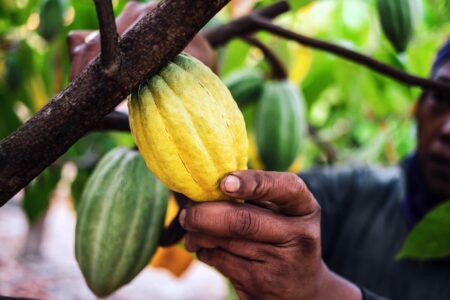Nestlé annual report underlines digital transformation focus, and enhanced support for cocoa communities

Nestlé’s latest Annual Report, released in conjunction with its Creating Shared Value and Sustainability (CSV) Report has unveiled its plans for continuing action to improve support for cocoa farmers in its global operations, reports Neill Barston.
As the company noted, 2022 proved a challenging year for the business, which required constant rebalancing between forward-looking investments, affordability, and meeting its commitments to shareholders and other stakeholders.
Significantly, the report highlighted for the first time the nutritional value of its complete food and drink portfolio, which revealed a core focus on delivering digitalisation of its operations, which it has identified as a key means of delivering a competitive edge and improving the efficiency of its operations.
The company’s confectionery interests around the world generated CHF 8.1 billion in revenues, and remain a notable element within its interests, with its related supply chains receiving focus within the report.
In terms of its support for farmers in key cocoa growing regions, the business noted its income accelerator program aims to improve the livelihoods of cocoa-farming families and tackle the root causes of child labour risks in cocoa production, while advancing sustainable farming practices.
Notably, the initiative is expanding a reportedly successful pilot of 1000 farmers in Ivory Coast to a further 10 000 families, which the company said would be assessed, adapting where necessary, before extending the program throughout our global cocoa supply chain by 2030.
As the Swiss-headquartered firm’s report clearly acknowledged – ‘poverty is the main reason that children work on cocoa farms,’ and in response, Nestle said it would be building on a decade of its Cocoa Plan and Child Labor Monitoring and Remediation System. These systems have been created to incentivise cocoa farming families to make sustainable changes that will help move them closer to a living income.
The report stated: “Through the accelerator, we pay a cash incentive directly to cocoa-farming households for activities such as pruning to increase crop productivity, planting shade trees to increase climate resilience, growing additional crops or raising livestock to diversify income, and enrolling children in school. Our suppliers send the payments when costs are typically high – like the back- to-school period. We also help farmers and women in the household access the training and resources needed to make the changes
To enable these payments and bring about lasting change, we are shifting our sourcing to segregated cocoa supplies that can be traced from the farming family all the way to our factory.”
Annual report progress
On its drive to offer greater transparency on nutritional values, it has benchmarked its products against the Health Star Rating (HSR) system, a nutrient profiling system used by the Access to Nutrition Index.
The results show that Nestlé products with an HSR rating of 3.5 stars and above, together with its specialised nutrition products, like infant or medical nutrition, account for close to 60% of the company’s sales (excluding Nestlé’s pet care business). The company has committed to setting a global target for the healthier part of its portfolio. Nestlé will complement this with more stringent responsible marketing practices as well as nutrition education programs and services to help people enjoy all foods as part of a balanced diet.
As part of its ‘Good for the Planet’ work, the firm further reduced greenhouse gas emissions to below its 2018 baseline. It is now well beyond peak carbon. The company achieved this result while growing its business substantially. Nestlé is tackling the emissions within its own operations head on. For example, it increased its use of renewable electricity last year and is on track to achieve 100% renewable electricity by 2025.
In line with the recommendations of the Task Force on Climate-related Financial Disclosures, the company also released its second voluntary Climate Risk and Impact Report. As a business leader, Nestlé is committed to transparency and action on climate-related risks and opportunities. Consequently, the company is releasing this report ahead of Swiss regulatory requirements.



